Related Research Articles

The Dead Sea Scrolls, also called the Qumran Caves Scrolls, are a set of ancient Jewish manuscripts from the Second Temple period. They were discovered over a period of 10 years, between 1946 and 1956, at the Qumran Caves near Ein Feshkha in the West Bank, on the northern shore of the Dead Sea. Dating from the 3rd century BCE to the 1st century CE, the Dead Sea Scrolls include the oldest surviving manuscripts of entire books later included in the biblical canons, along with extra-biblical and deuterocanonical manuscripts from late Second Temple Judaism. At the same time, they cast new light on the emergence of Christianity and of Rabbinic Judaism. Almost all of the 15,000 scrolls and scroll fragments are held in the Shrine of the Book at the Israel Museum, located in the city of Jerusalem. The Israeli government's custody of the Dead Sea Scrolls is disputed by Jordan and the Palestinian Authority on territorial, legal, and humanitarian grounds—they were mostly discovered following the Jordanian annexation of the West Bank and were acquired by Israel after Jordan lost the 1967 Arab–Israeli War—whilst Israel's claims are primarily based on historical and religious grounds, given their significance in Jewish history and in the heritage of Judaism.
Lawrence Harvey Schiffman is a professor at New York University ; he was formerly Vice-Provost of Undergraduate Education at Yeshiva University and Professor of Jewish Studies. He had previously been Chair of New York University's Skirball Department of Hebrew and Judaic Studies and served as the Ethel and Irvin A. Edelman Professor in Hebrew and Judaic Studies at New York University (NYU). He is currently the Judge Abraham Lieberman Professor of Hebrew and Judaic Studies at New York University and Director of the Global Institute for Advanced Research in Jewish Studies. He is a specialist in the Dead Sea Scrolls, Judaism in Late Antiquity, the history of Jewish law, and Talmudic literature.

Joseph Augustine Fitzmyer was an American Catholic priest and scholar who taught at several American and British universities. He was a member of the Society of Jesus (Jesuits).
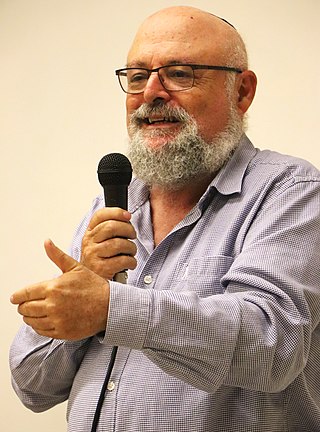
Israel Knohl is an Israeli Bible scholar and historian. He is the Yehezkel Kaufmann Professor of Biblical studies at the Hebrew University of Jerusalem and a Senior Fellow at Shalom Hartman Institute in Jerusalem. His books deal with the integration of scientific and archaeological discoveries with the biblical account, early Israelite beliefs, a survey of Israelite cult, and how and where the Israelites originated.

Emanuel Tov, is a Dutch–Israeli biblical scholar and linguist, emeritus J. L. Magnes Professor of Bible Studies in the Department of Bible at the Hebrew University of Jerusalem. He has been intimately involved with the Dead Sea Scrolls for many decades, and from 1991, he was appointed Editor-in-Chief of the Dead Sea Scrolls Publication Project.
Chaim Menachem Rabin was a German, then British, and finally Israeli professor of Hebrew and Semitic languages.

Vidal Sassoon International Center for the Study of Antisemitism (SICSA) is a research center affiliated with the Hebrew University of Jerusalem. It was named for Vidal Sassoon, who financed its establishment in 1983.
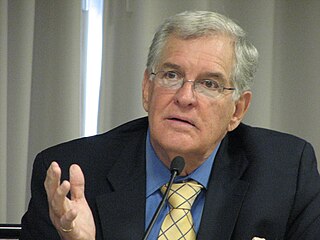
James Hamilton Charlesworth is an American academic who served as the George L. Collord Professor of New Testament Language and Literature until January 17, 2019, and Director of the Dead Sea Scrolls Project at the Princeton Theological Seminary. His research interests include the Apocrypha and Pseudepigrapha of the Hebrew and Christian Bibles, the Dead Sea Scrolls, Josephus, the Historical Jesus, the Gospel of John, and the Book of Revelation.
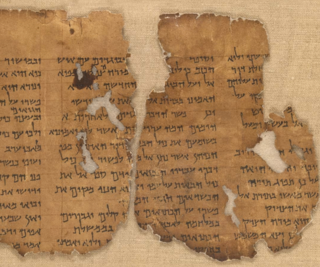
The Habakkuk Commentary or Pesher Habakkuk, labelled 1QpHab, was among the original seven Dead Sea Scrolls discovered in 1947 and published in 1951. Due to its early discovery and rapid publication, as well as its relatively pristine preservation, 1QpHab is one of the most frequently researched and analyzed scrolls of the several hundred now known.

The Van Leer Jerusalem Institute (VLJI) is a center for the interdisciplinary study and discussion of issues related to philosophy, society, culture, and education. The Institute was established in order to create a body of knowledge and discourse and to give expression to the wide range of disciplines and opinions in Israel. The contribution of a core of renowned scholars facilitates the implementation of reforms and new approaches in various social spheres.

Frank Moore Cross Jr. was the Hancock Professor of Hebrew and Other Oriental Languages at Harvard University, notable for his work in the interpretation of the Dead Sea Scrolls, his 1973 magnum opusCanaanite Myth and Hebrew Epic, and his work in Northwest Semitic epigraphy. Many of his essays on the latter topic have since been collected in Leaves from an Epigrapher's Notebook.

William M. Schniedewind holds the Kershaw Chair of Ancient Eastern Mediterranean Studies and is a Professor of Biblical Studies and Northwest Semitic Languages at the University of California, Los Angeles.

Who Wrote the Dead Sea Scrolls? The Search for the Secret Of Qumran is a book by Norman Golb which intensifies the debate over the origins of the Dead Sea Scrolls, furthering the opinion that the scrolls were not the work of the Essenes, as other scholars claim, but written in Jerusalem and moved to Qumran in anticipation of the Roman siege in 70 AD.
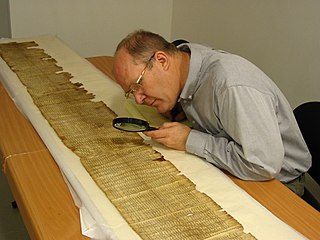
Donald W. Parry is an American academic who is a professor of Hebrew Bible in the Department of Asian and Near Eastern Languages at Brigham Young University. He holds the Abraham O. Smoot Professorship. He is the author and editor of works related to the Dead Sea Scrolls and the Hebrew Bible. He has been a member of the International Team of Translators of the Dead Sea Scrolls since January 1994. He served as a member of the Dead Sea Scrolls Foundation Board of Advisors, 2008–present and presently serves as a member of the Dead Sea Scrolls Foundation Board of Trustees. He is also a member of the International Organization for the Study of the Old Testament, and the National Association of Professors of Hebrew.
Jonas Carl Greenfield was an American scholar of Semitic languages, who published in the fields of Semitic Epigraphy, Aramaic Studies and Qumran Studies, and a distinguished member of the Israel Academy of Sciences and Humanities.
John J. Collins is an Irish-born American biblical scholar, the Holmes Professor of Old Testament Criticism and Interpretation at Yale Divinity School. He is noted for his research in the Hebrew Bible, as well as the apocryphal works of the Second Temple period including the sectarian works found in Dead Sea Scrolls and their relation to Christian origins. Collins has published and edited over 300 scholarly works, and a number of popular level articles and books. Among his best known works are the Between Athens and Jerusalem: Jewish Identity in the Hellenistic Diaspora ; Daniel in the Hermeneia commentary series ; The Scepter and the Star. The Messiahs of the Dead Sea Scrolls and Other Ancient Literature ; and The Bible after Babel: Historical Criticism in a Postmodern Age.
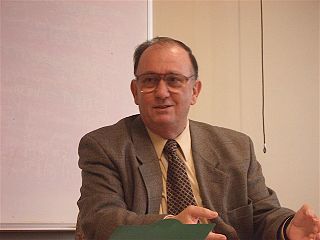
Michael Edward Stone is a professor emeritus of Armenian Studies and of Comparative Religion at the Hebrew University of Jerusalem. His research deals with Armenian studies and with Jewish literature and thought of the Second Temple period. He is also a published poet.
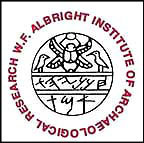
The W. F. Albright Institute of Archaeological Research (AIAR) is an archaeological research institution located in East Jerusalem. It is the oldest American research center for ancient Near Eastern studies in the Middle East. Founded in 1900 as the American School of Oriental Research, it was renamed in 1970 after its most distinguished director and the father of biblical archaeology, William F. Albright. Its mission is to develop and disseminate scholarly knowledge of the literature, history, and culture of the Near East, as well as the study of civilization from pre-history to the early Islamic period.
Martin G. Abegg Jr. is a Dead Sea Scrolls scholar, researcher, and professor. Abegg is responsible for reconstructing the full text of the Dead Sea Scrolls from the Dead Sea Scrolls concordance, a project that broke the lengthy publication monopoly held on the scrolls. He went on to co-direct the Dead Sea Scrolls Institute at Trinity Western University from 1995 to 2015. Here, Abegg held the Ben Zion Wacholder Professorship. Because Abegg is an influential Dead Sea Scrolls scholar, he has been honoured with a collection of essays written by his peers and students.
Eileen Marie Schuller is a professor at the Faculty of Social Sciences at McMaster University in Hamilton, Ontario. Schuller is an official editor of the Dead Sea Scrolls. She teaches undergraduate and graduate studies in the Biblical field. Over a span of 30 years, her involvement in the publication of the Dead Sea Scrolls has led to numerous contributions in authenticating the discoveries found in the caves near the Ancient Qumran settlement.